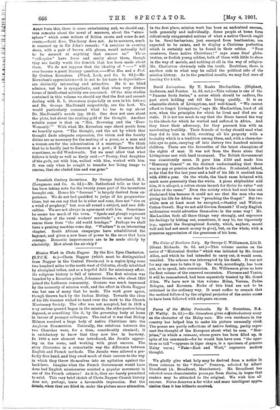David Livingstone. By T. Banks MacLachlan. (Oliphant, Anderson, and Ferrier.
Is. 6d. net.)—This volume is one of the "Famous Scots Series," a series which should be endless, the past stock holding out till the living qualify. It is an admirable sketch of Livingstone, and well-timed. " We cannot afford to forget Livingstone," says Mr. BiacLachlan, least of all now, when the principles for which he lived and died are at stake. It is not too much to say that the Boers barred the way to the ideals for which he worked and suffered in Africa. And they knew their adversary, for they pursued him with an unrelenting hostility. Their friends of to-day should read what they did to him in 1852, wrecking all his property with a brutality which is a tradition among them, and, with a character- istic eye to gain, carrying off into slavery two hundred mission children. These are the favourites of the latest champions of the rights of man. It was not from the Boers alone that Livingstone met with hard treatment. The British Government was consistently mean. It gave him £500 and made him "Honorary Consul" on the distinct understanding that there was no pay or pension attached to the office. It relented, indeed, so far that for the last year and a half of his life it credited him with £300 a year. On the whole, the black races behaved with much more generosity than the white. A pious shipbuilder sold him, it is alleged, a rotten steam launch for thrice its value " out of love of the cause." Even the society which had sent him out disclaimed him because it could not see that the man who was giving his life for Africa was "preaching the Gospel." But two white men at least must be excepted,—Stanley and William Cotton Oswell. May we not add Gordon Bennett ? If only English millionaires would advertise themselves in the same way ! Mr. BlacLachlan feels all these things very strongly, and expresses his feelings by hitting out, sometimes, it may be, too vigorously (e.g., against the Geographical Society, which, anyhow, meant well and had not much money to give), but, on the whole, with a generous appreciation of the greatness of his hero.










































 Previous page
Previous page